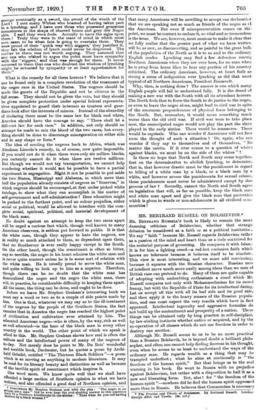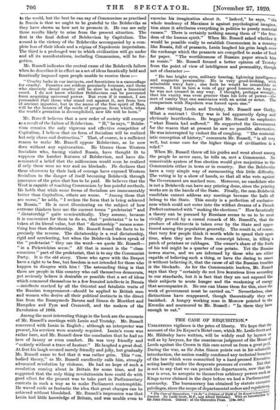MR. BERTRAND RUSSELL ON BOLSTIRVISM.* MR. BERTRAND Rusames book is
likely to remain the most damning criticism of Bolshevism, whether that strange delusion be considered as a faith or as a political institutior. We say " faith " because Mr. Russell regards Bolshevism rather as a passion of the mind and heart than as a code contrived for the material purpose of governing. He compares it with Islam. It is for him a fighting creed—a red-hot exclusive faith which knows no tolerance because it believes itself to be absolute. This view is most interesting, and we must add convincing, because it squares with the Russian character. Russian men of intellect move much more easily among ideas than we men of British race can pretend to do. Many of them are quite capable of adopting with undoubting enthusiasm a creed which Mr. Russell compares not only with Mohammedanism for he moral frenzy, but with the Republic! of Plato for its intellectual daring. Let us accept all this with all its bad side and its good side, and then apply it to the heavy mamma of the Russian popula- tion, and one must expect the very results which have in fact appeared. Intellectual ingenuity and aggressive formulae do not build up the contentment and prosperity of a nation. These things can be obtained only by long practice in self-discipline, by law-abiding instincts whether native or acquired, and by the co-operation of all classes which do not use freedom in order to destroy one another.
Although Mr. Russell SOQ11313 to us to be no more practical than a Russian Bolshevik, he is beyond doubt a brilliant phic. sopher, and often one cannot help finding fineness in his thought, even when he seems to us least to understand the ways of the ordinary man. He regards wealth as a thing that may be trampled underfoot ; what he aims at continually is" the freedom of the human spirit." But that brings us to the real warning in his book. He went to Russia with no prejudice against Bolshevism, but rather with a disposition to hail it as a now and liberating force. But, alas! for "the freedom of the human spirit "—nowhere did he find the human spirit oppressed more than in Russia. He believes that Communism is necessary • The Practice and Theory of Boldweisee. By Bertrand Rama. London: George Allen and Dawn'. lea. net.] to the world, but the best he can say of Communism as practised In Russia is that we ought to be grateful to the Bolsheviks as they have shown us how not to promote it. He can see only three results likely to arise from the present situation. The first is the final defeat of Bolshevism by Capitalism. The second is the victory of the Bolsheviks accompanied by a com- plete loss of their ideals and a regime of Napoleonic imperialism. The third is a prolonged war in which civilization will go under and all its manifestations, including Communism, will be for- gotten.
Mr. Russell indicates the central cause of the Bolshevik failure when he describes it in effect as a sot of ideas fanatically held and fanatically imposed upon people unable to receive them :— " Cruelty lurks in our instincts, and fanaticism is a camouflage for cruelty. Fanatics are seldom genuinely humane, and those who sincerely dread cruelty will be slow to adopt a fanatical creed. I do not know whether Bolshevism can be prevented from acquiring universal power. But even if it cannot, I am persuaded that those who stand out against it, not from love of ancient injustice, but in the name of the free spirit of Man, will be the bearers of the seeds of progress, from which, when the world's gestation is accomplished, new life will be born."
Mr. Russell believes that a new order of society will emerge as a result of the failure of Bolshevism. "If," he says, " Bolshe- vism remains the only vigorous and effective competitor of Capitalism, I believe that no form of Socialism will be realized but only chaos and destruction." That, of course, is a sufficient reason to make Mr. Russell oppose Bolshevism, as he now does without any equivocation. He blames those Western Socialists who, having visited Russia, have thought fit to suppress the harsher features of Bolshevism, and have dis- seminated a belief that the millennium would soon be realized if only there were no war and no blockade. He declares that these observers by their lack of courage have exposed Western Socialism to the danger of itself becoming Bolshevik through ignorance of the price that has to be paid. He believes that the West is capable of reaching Communism by less painful methods. He holds that while some forms of Socialism are immeasurably better than Capitalism, others are worse. "Among those that are worse," he adds, "I reckon the form that is being achieved in Russia." He is most illuminating on the subject of how extreme thinkers here use the current terms "proletariat" and " dictatorship " quite unscientifically. They assume, because it is convenient for them to do so, that " proletariat " is to be taken at its literal value, but that " dictatorship " means some- thing less than dictatorship. Mr. Russell found the facts to be precisely the reverse. The dictatorship is a real dictatorship, rigid and unrelenting, but when the Bolshevik leaders speak of the " proletariat " they use the word—we quote Mr. Russell- " in a Pickwickian sense." All that is meant is the " class- conscious " part of the proletariat, that is to say the Communist Party. It is the old story. Those who agree with the Despot have a right to be free, but freedom is not intended for those who happen to disagree with him ! The astounding thing is that there are people in this country who call themselves democrats, yet seriously believe it desirable or possible that a set of ideas which commend themselves to a few frenzied intellects in Russia —intellects marked by all the Oriental and fatalistic traits of the Russian temperament—should be applied to British men and women who derive all their political instincts in the direct line from the Runnymede Barons and Simon de Montfort and Hampden and Pym and Cromwell, and the makers of the Revolution of 1688.
Among the most interesting things in the book are the accounts of Mr. Russell's meetings with Lenin and Trotsky. Mr. Russell conversed with Lenin in English ; although an interpreter was present, his services were scarcely required. Lenin's room was rather bare, and Mr. Russell drew the conclusion that he had no love of luxury or even comfort. He was very friendly and entirely without a trace of hauteur." Ho laughed a great deal. At first his laugh seemed merely friendly and jolly, but gradually Mr. Russell came to feel that it was rather grim. This "cm. bodied theory," as Mr. RUSH011 excellently calls him, strongly advocated revolution by violence. He had no hope of such a revolution coming about in Britain for some time, and he suggested that the only thing revolutionists hero could do with good effect for the present was to take part in Parliamentary contests in such a way as to make Parliament contemptible. He waved aside as fantastic the idea that groat changes can be achieved without bloodshed. Mr. Russell's impression was that Lenin had little knowledge of Britain, and was unable even to exercise his imagination about it. " Indeed," he says, "the whole tendency of Marxisms is against psychological imagine. tion since it attributes everything in politics to purely material causes." There is certainly nothing among them of "the free. dom of the human spirit." When Mr. Russell asked whether it would be possible really to establish Communism in a country like Russia, full of peasants, Lenin laughed his grim laugh over the exchange which the peasants are compelled to make of food for paper. "The worthlessness of Russian paper struck him as comic." Mr. Russell formed a better opinion of Trotsky from the point of view of intelligence and personality, though not of character :—
"He has bright eyes, military bearing, lightning intelligence and magnetic personality. Be is very good-looking, with admirable wavy hair ; one feels he would be irresistible to women. I felt in him a vein of gay good humour, so long es he was not crossed in any way. I thought, perhaps wrongly, that his vanity was even greater than his love of power—the sort of vanity that one associates with an artist or actor. The comparison with Napoleon was forced upon one."
After visiting Lenin and Trotsky, Mr. Russell saw Gorky. What a contrast ! Gorky was in bed apparently dying and obviously heartbroken. Ho begged Mr. Russell to emphasize "what Russia had suffered." Ho supported the Government for the reason that at present he saw no possible alternative. He was interrupted by violent fits of coughing. "The material- istic conception of history," comments Mr. Russell, "is all very well, but some care for the higher things of civilization is a relief."
When Mr. Russell threw off his guides and went about among the people he never once, he tells us, met a Communist. No conceivable system of free election would give majorities to the Communists either in town or in country. But the Bolsheviks have a very simple way of surmounting this little difficulty. The voting is by a show of hands, so that all who vote against the Government are marked men. Moreover, no candidate who is not a Bolshevik can have any printing done, since the printing works are in the hands of the State. Finally, the non-Bolshevik candidate cannot address any meetings because the halls all belong to the State. This surely is a perfection of exclusive- ness which could not enter into the wildest dreams of a French Prefect entrusted with "making the elections." How fanatically a theory can be pursued by Russians seems to us to be most vividly proved by a casual remark of Mr. Russell's, that the produce of allotments is taken over by the State and appor- tioned among the population generally. The result is, of course, that very few people think it worth while to spend their spars time, when they are free from conscript labour, in tilling a patch of potatoes or cabbages. The owner's share of the fruits of his toil might be a quarter of one potato. Yet the Russian towns starve, and we are informed by those who are either capable of believing such a thing, or have the daring to assert it without believing it, that the cause of all the Russian troubles is the blockade. As for the Communistic leaders, Mr. Russell says that they "certainly do not live luxurious lives according to our standards, but it is fact that they are not exposed like their subjects to acute hunger and the weakening of energy
that accompanies it. No one can blame them for this, since the work of government must be carried on." Nevertheless, class distinctions havo reappeared, though theoretically they an banished. A hungry working man in Moscow pointed to the Kremlin and murmured to Mr. Russell : "in there they have enough to oat."







































 Previous page
Previous page